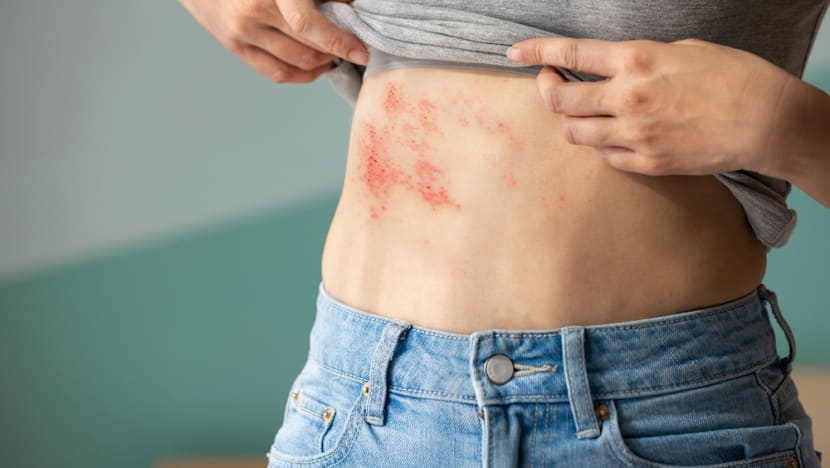Why shingles hits harder with diabetes
Diabetes weakens the immune system, leaving individuals more vulnerable to shingles and its complications, says an expert.

Shingles causes a painful rash, often appearing as red blotches or blisters on one side of the body. Photos: Shutterstock

This audio is generated by an AI tool.
Chickenpox may seem like a childhood illness of the past, but the varicella-zoster virus that causes it never fully disappears. Decades later, it can reactivate as shingles, causing an itchy, painful rash of blisters. The condition usually clears within weeks, but the burning or tingling pain can be intense.
Anyone who has had chickenpox is at risk of shingles and the chance increases with age. People with Type 1 diabetes are more than twice as likely to develop shingles as those without diabetes. Those with diabetes – both Type 1 and Type 2 – are also more than three times as likely to be hospitalised for shingles and its complications compared to those without diabetes. Complications of shingles can include post-herpetic neuralgia (long-term nerve pain), bacterial skin infections and high fever.
Managing diabetes already requires constant attention – from monitoring blood glucose and taking prescribed medications to fitting in regular meals on busy days, shared Dr Bee Yong Mong, president of Diabetes Singapore. Given these daily demands, it’s important for individuals with diabetes to be aware of their higher risk of developing shingles and its potential complications.
WHEN TWO HEALTH CHALLENGES COLLIDE

This year’s World Diabetes Day, which falls on Nov 14, focuses on diabetes and the workplace, underscoring how the condition affects not just physical health but overall well-being.
Dr Bee explained that because of their increased risk of infections and slower recovery, those living with diabetes may need more medical leave and time off to attend medical appointments. “At work, this can be misunderstood, leading to perceptions of unreliability and missed opportunities.”
These challenges aren’t limited to the workplace. According to Dr Bee, diabetes creates low-grade inflammation that disrupts the body’s defences and slows healing, leaving individuals more vulnerable to severe outcomes. “High blood sugar levels impair the function of white blood cells, which are critical for defending against infections,” he said. “By weakening the immune system, diabetes makes it harder for the body to fight off viral infections like shingles.”
KEEPING HEALTH ON TRACK
After shingles, even individuals with well-controlled diabetes may find their condition harder to regulate. Based on his clinical experience, the pain, stress hormones triggered by infection and additional medications can complicate diabetes management, said Dr Bee.
“All this may lead to poor glycaemic control,” he said. “Viral infections can trigger inflammation in the body, which has been linked to insulin resistance.”
Dr Bee stressed that protecting against shingles should be part of overall diabetes care. Alongside medical support, people with diabetes should maintain healthy routines such as eating a balanced diet low in added sugars and refined carbohydrates, exercising regularly, reducing stress, sleeping well and avoiding smoking and alcohol. Good hygiene also matters: Regular handwashing, daily foot checks and proper oral care can help lower infection risks, which individuals with diabetes are more prone to.
He further emphasised the importance of consistent blood glucose monitoring, adherence to prescribed medications and regular check-ups. “It is far easier to prevent shingles than to cope with its pain and complications,” said Dr Bee. “Patients should work with their doctors on ways to stay protected and address symptoms promptly.”
In conjunction with 11.11 Shingles Consultation Day, individuals with diabetes or those aged 50 and above are encouraged to consult a healthcare professional about preventive measures against shingles.
This health message is intended for audiences in Singapore only and is meant for disease awareness and educational purposes. It does not endorse, make reference to and/or recommend any product. Speak to a healthcare professional to learn more about shingles, treatment options and prevention methods. Information in this article is valid as of Nov 7, 2025.
All images used in this material are for illustration purposes only. Views expressed by the expert are solely his own and based on his clinical knowledge. For reporting of adverse events, write to sg.drugsafety [at] gsk.com. 2025 GSK group of companies or its licensor. NP-SG-HZU-ADVR-250003. Approval date: November 2025















